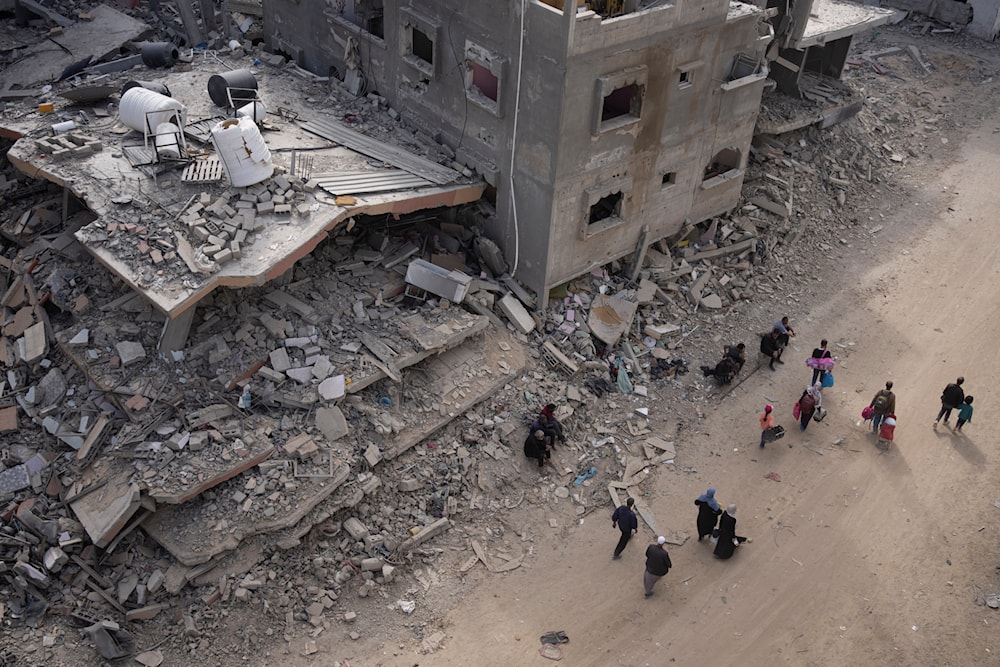Day 192: 33,797 killed, 76,465 injured in Gaza
On the 192nd day since October 7, the Israeli occupation forces continue to massacre Palestinians in Gaza with 68 killed in the past 24 hours.
-

Palestinians walk through the destruction in the wake of an Israeli air and ground offensive in Khan Younis, southern Gaza Strip, Monday, April 8, 2024. (AP)
The Ministry of Health in Gaza reported today that the number of Palestinians killed in Gaza due to the Israeli genocide since October 7 has risen to 33,797 and those injured to 76,465.
Israeli occupation forces committed seven massacres in the past 24 hours against families in Gaza, killing 68 Palestinians and injuring 94 others.
The ministry stressed that victims are still under the rubble on the streets, as the IOF deliberately prevent ambulances and civil defense crews from reaching them.
OCHA reports Israeli crimes
41% of UN-coordinated aid missions to northern Gaza between 6 and 12 April were "impeded or denied access" by "Israel", the United Nations Office for the Coordination of Humanitarian Affairs (OCHA) posted on X on April 14.
41% of @UN-coordinated aid missions to northern #Gaza between 6 and 12 April were impeded or denied access.
— OCHA oPt (Palestine) (@ochaopt) April 14, 2024
The Israeli authorities' obligation to facilitate humanitarian support only ends when aid reaches civilians.#AccessDenied
More: https://t.co/5jlmTLkGFl pic.twitter.com/hZtW6xZDl5
The UN office further urged the Israeli occupation to "facilitate humanitarian support" by highlighting that its obligation ends when aid reaches Palestinians.
In an update on Khan Younis, OCHA, referenced a UN inter-agency assessment mission to the area on April 10 after the withdrawal of IOF, which highlighted the devasting destruction of homes, schools, hospitals, medical centers, and roads among other civilian infrastructure in the area.
Among the buildings discovered as "significantly damaged", were a UN warehouse and Nasser Hospital, including "substantial amounts" of medications and trauma supplies given as humanitarian assistance.
OCHA further said that WHO staff reported the scene around multiple hospitals and labeled the destruction as "disproportionate to anything one can imagine." The hospitals listed are Nasser Hospital, Al-Amal Hospital, and Al-Khair Hospital which the staff labeled as "non-functional," highlighting that they require assessments to evaluate if specialized medical devices, CT scanners, oxygen plants, generators, and solar panels "can function again,"
OCHA said that the UN team made up of representatives of OCHA, UNRWA, WHO, WFP, UNMAS, and UNFPA, also reported that Palestinians who went back to the area alongside those who never left are grappling with dire shortages of food, water, and other critical supplies, as well as collapsed services.
It highlighted that they are at severe safety risks due to unexploded ordnance (UXOs) are still in the area including 1,000-pound bombs on main road intersections and inside schools.
OCHA also referenced a report by the Humanitarian Coordinator ad interim, Jamie McGoldrick during a visit on April 9 to UNRWA school sheltering tens of thousands of internally displaced Palestinians in Khan Younis which said that thousands of internally displaced Palestinians are among those at risk as they are in need dire need of humanitarian support services, including health, water and sanitation, food, and specialized support for women and disabled people.

 3 Min Read
3 Min Read








